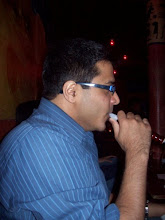Half the 'Taare' rating for 'Tare Zameen Par'.

No matter how much Bollywood jades you, the belief that the juggernaut is capable of dishing out sense, albeit, at the dismal rate of one (good) flick per annum, still lingers. This 'eternal optimist / gullible' side of me, spliced last evening's cardio workout with 'Taare Zameen Par' (TZP), expecting a sensitive and piquant treatment of a rather grave theme, 'The affliction of a dyslexic kid in a third world country'. Disappointed to say that it only half delivered. Sensitive at times, it turns out to be midway between mainstream and alternative (in the Bollywood frame of reference). Desis are touting it for the Oscars, but ain't we an ethno-centric bunch :-), lets just be happy with the 'awareness' the movie creates.
Here are the good parts without any spoilers: For a change, the protagonist isn't a big-name star, but a brilliant actor of a kid. You're sure to be smitten by middle-school nostalgia, with its treatment of teachers' idiosyncrasies, student indolence to homework, afternoon reveries in Hindi class, rebellion to authority (my favorite part) and wander-ous walks back home hauling a school-bag of back breaking proportions. The revelation of Abishek Bacchan's dyslexia had the audience in splits, no surprises there though. The highlight has to be the depiction of the boy's estrangement, when he's put into boarding school – pack em tissues, you might shed a tear or two.
Back to the scrutiny – India is a developing country of 1.2 billion. Roughly 25% of its population is below the poverty line, going by the the UN's definition, which simply accounts for daily income. The dismal reality is that rural India, which is roughly 60% of the populace, has little or no access to clean drinking water, sanitation, health care, education, proper shelter, access to information, and sometimes, human rights like right to free speech, religion etc. The many religions, castes, ethnicities and languages that make India, cohabit the ancient land as a bitter-sweet symphony of love, hate and apathy, tipping points and clashes being the norm rather than the exception. The 35% classified as middle class, live in high stress, high density urban sprawls with disproportionate access to infrastructure. Heck, the silicon valley of India, Bangalore, receives water once in two days, for 3 hours only – without overhead tanks and domestic water storage mechanisms, it'd collapse. Not to mention the 2 hour daily power cuts in summer, crumbling-clogged roads and drains, rampant corruption, ETC (Yes, et cetera in caps, for the roster of disasters are infinite). What relevance does all this have to TZP? The point is, India can be ruthless to the normal, leave alone the disabled.
True picture of the Majority Life in India.
The strain of Indian living fails to percolate into the characters. The insensitive dad, whose role in the family reduces to that of a provider, more than a father, although a universal concept transgressing national boundaries, has unique factors influencing it in the 'family-centric' India culture, that are drastically different from the 'time deprived working professional' kind of scenario endemic to the west. It has deep connections to the challenges of eking out a living in the hostile aforementioned conditions that lead to unrealistic competition in all spheres of life (this message never comes through). The teachers' inability to spot a classic case of dyslexia reflects on the rickety base of our system, built on the shoulders of unqualified and untrained teaching professionals. And then, we wonder why we suffer from a corruption epidemic -- it starts in the schools, with the average and below tormented by teachers and peers, battered by a system that only rewards rote learning, subject to poor financial conditions at home, all adding up to a breakdown in the moral and emotional fabric of the person.
The plot could have used a few more accents - India, or other wise, kids with the slightest of quirks are given hell. A couple bloody fights, with seniors or the class bully, leaving the boy shattered, would have been a credible addition. Highlighting the kid's evolution into a borderline sociopath, would lend an insight into how social norms can pressure a normal person into dark corners -- A scene in geometry class, where the boy stabs the class bully with his compass, would set this up nicely. An abusive martinet of a Resident Assistant in the hostel, bending towards pedophilia, preying on the less abled, driving the already estranged, sociopathic kid to the brink of insanity, edging to the point of no return, would have been a nice place for the healing process to begin – a chance to portray that no one is beyond remedy.
Lacklusture songs with cliched visualizations wastefully lengthen the movie, other than adding to the 'uncalled for' masala index. Amir's entrance spiked with grandeur, immediately has you guessing that hes a case of dyslexia gone bad.
**==== End of Formal Review====**
Speaking of which, don't you think Himesh Reshamiya was/is dyslexic? Heck, hes a borderline retard even. He apparently stars in a show called 'Sa re Ga Ma', with other such simian characters, making it rather amusing to follow. Tell me if you find videos of his antics on the internet!
Himesh: Dyslexia Gone Bad
If only Mira Nair had made the movie, Sigh!! (Did you guys watch Namesake, its brilliant. So is Salaam Bombay, Monsoon Wedding, Kama Sutra, Bollywood Calling, and every thing else from the woman with the Midas touch. Shantaram should be mouthwatering!).



